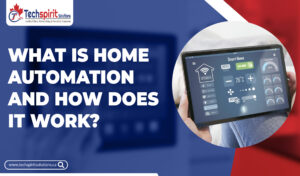VoIP has redefined the way we communicate in today’s digital world. It has become increasingly popular as an alternative to outdated phone systems, offering a more flexible and cost-effective means of communication. But how exactly does a VoIP system work? In this article, we’ll delve into the exciting world of VoIP, exploring its workings, requirements, and how to choose the right one for you.
Table of Contents
ToggleWhat is VoIP ?
Voice over Internet Protocol (VOIP) is a technology that allows users to make phone calls using the Internet. It converts voice signals into digital packets and transmits them over the internet, transforming ordinary conversation into a seamless digital experience. VoIP does not rely on copper wires or circuit-switched networks unlike traditional landline connections. Instead, it leverages internet protocols to send data and voice messages in real-time.
How Does a VoIP System Work ?
A VoIP system converts analog signals into digital packets using codecs, which are then transmitted over an IP network. VoIP packets can be sent over any network that supports VoIP, including local area networks (LANs) and wide area networks (WANs).
When you make a call using a VoIP phone, the analog voice signals are transformed into digital signals. This digital voice signal is sent to the recipient over the internet. The recipient’s device receives these packets and converts them back into analog signals, allowing the recipient to hear the message clearly. Data packets enable the efficient transmission of voice signals over a long distance in a much more cost-effective manner than regular telephones.
VoIP operates via the Internet. Therefore, your data is stored securely on cloud servers. The VoIP system is controlled through an online dashboard. Users can add new phone numbers, change contacts, change business phone numbers, and enable call forwarding from this dashboard.
VoIP for Business
Hosted Cloud PBX
One of the key ways businesses utilize VoIP is through hosted cloud private branch exchange(PBX) systems. Businesses can use a cloud-based solution to get rid of an expensive and time-consuming internal physical PBX system. Businesses don’t need to invest in expensive hardware and ongoing maintenance as hosted PBX eliminates this need by providing the entire communication infrastructure hosted and managed by a service provider. This approach offers scalability, increased reliability, and advanced features, such as call routing, voicemail, and call forwarding, which enhance the overall communication experience for businesses of all sizes.
SIP Trunking
Another popular VoIP solution for business is SIP trunking. Organizations can send audio, video, and data over the internet by connecting their PBXs to SIP. Businesses can use their internet connection to make and receive calls instead of traditional phone lines using SIP trunking. This allows more flexibility and scalability in addition to cost savings. SIP trunking empowers businesses to manage multiple calls at once, add or remove lines as needed, and even set up virtual offices across different locations while maintaining a smooth and professional communication experience.
How Does VoIP Work with Different Devices ?
Analogue Telephone Adapter
An analog telephone adapter is used to enable the use of VoIP with traditional analog telephones. It converts analog voice signals into digital data that can be transmitted over the internet. Since ATA is connected to both the internet and the standard phone, it allows users to make and receive calls using their existing phone without investing in VoIP-specific devices.
VoIP Handset
VoIP handsets are designed to work with VoIP systems and allow users to make and receive calls directly over the internet. VoIP handsets offer customers a rich and flexible communication experience with their advanced capabilities and configurable settings.
Smartphones
With the help of dedicated VoIP apps, users can use their data connection to make calls instead of depending on cellular networks. Through the use of VoIP technology, these apps enable users to send voice data over the internet. In addition, many VoIP apps provide extra features like conference calls, chat, and video calls to improve the overall communication experience.
Computers and Laptops
Computers and laptops can also be utilized as VoIP devices. With desktop apps such as Skype and Google Talk, users can make and receive calls directly from their computers. It allows smooth communication regardless of physical location.
VoIP Phone System vs Traditional Phone System
The shift from traditional phone systems to VoIP offers numerous advantages. First, VoIP eliminates the need for a dedicated physical network, such as copper wires and phone switches and allows for the consolidation of voice and data communications. This integration simplifies network management and reduces infrastructure costs as it is quick and easy to set up VoIP.
Additionally, the VoIP phone system provides many advanced features that are not available in traditional phone systems. These include voicemail-to-email transcription, call forwarding to multiple devices, automated attendants and virtual phone numbers.
VoIP Phone System Requirements
Certain requirements must be met to set up a phone system:
1. Network Bandwidth
VoIP calls require a sufficient amount of network bandwidth to ensure clear and uninterrupted communication. The bandwidth requirements depend on the number of concurrent calls and the audio quality desired. Businesses should assess their bandwidth capabilities to ensure a smooth VoIP experience.
2. Phones and Devices
Another important consideration when using VoIP is ensuring you have appropriate devices in place that are compatible with your chosen VoIP provider.
3. SIP Phones
Session Initiation Protocol (SIP) phones are hardware devices that resemble traditional desk phones. They connect directly to the internet and offer a familiar user experience. SIP phones are suitable for businesses that prefer a traditional phone setup.
4. Softphones
Softphones are software applications that allow users to make calls using their cell phone, laptop, or desktop. They are convenient for remote workers and individuals on the go.
5. Analog Telephone Adapters
Analog telephone adapters enable traditional analog phones to connect to a VoIP system. ATAs are a cost-effective solution for businesses that use their existing analog phones.
Choosing the Right VoIP Phone System for You
Selecting the right VoIP phone system for your business involves considering several factors:
1. Initial and Monthly Costs
Are there any upfront costs, such as hardware purchases, VOIP installation and setup fees? Also, evaluate the ongoing monthly fees for the service. Compare different providers to find the most cost-effective option that meets your requirements.
2. Reliability
Consider the reliability and uptime guarantees provided by the VoIP service provider. Downtime can result in lost business opportunities, so ensure that the provider has a robust infrastructure and backup systems.
3. Quality of Customer Service
Research the and reputation of the company and assess the quality of their customer service. How fast can you find a solution to your requests in case of technical issues or assistance with system setup and troubleshooting?
4. Ease of Use of the Products and Services
Look for a VoIP phone system that offers a user-friendly interface and easy configuration to achieve success with VoIP. A system with intuitive features and an accessible management portal will ensure a smooth transition and minimize the learning curve for your team.
5. Customer Reviews and Case Studies
Check customer reviews and case studies to gain insight into the experience of a business similar to yours. This will determine the satisfaction level and success stories of existing VoIP users.
Conclusion
As technology continues to advance, VoIP systems are gaining popularity among businesses of all sizes and industries due to their flexibility, scalability, reliability, and cost-effectiveness. By converting voice signals into digital data and transmitting them over the internet, VoIP enables efficient and reliable communication over long distances. With the popularity of SIP trunking and cloud-based PBX systems, businesses can use VoIP to improve their communication infrastructure. VoIP can also be used with a variety of devices, including computers, laptops, smartphones, dedicated VoIP handsets and analog telephones with the help of analog telephone adapters.
While choosing a VoIP phone system, consider factors like costs, reliability, customer service, ease of use, and customer reviews to ensure a reliable setup and pleasant experience. Embrace the power of VoIP and unlock a new era of communication efficiency and productivity.








